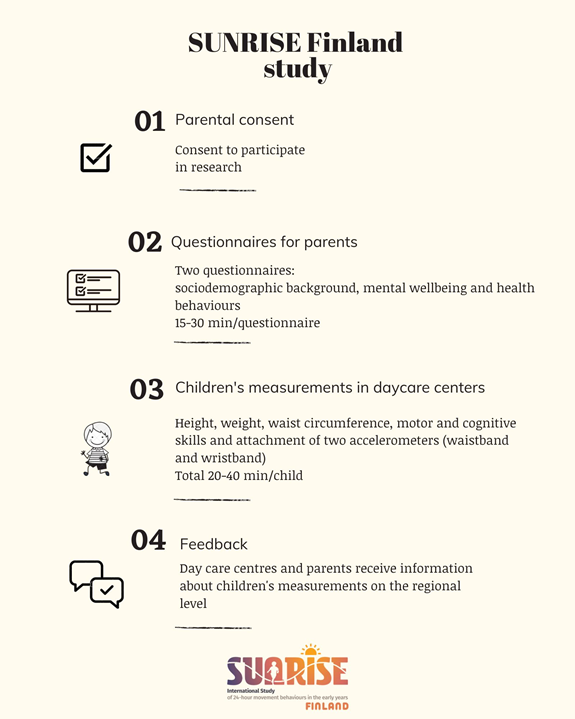SUNRISE Finland Pilot Study
The SUNRISE Finland Pilot Study was conducted in Folkhälsan daycare centres and in a few communal daycare centres in Southern Finland during early 2022. The aim of the pilot study was to test the feasibility of the SUNRISE study’s measurements in Finland.
Data Protection Statement

Children’s measurements in daycare centres
All measurements of the SUNRISE Finland pilot study are performed together with a member of a trained research team, prioritizing the child's comfort and enjoyment of playful tests. The measurements last a total of about 45-50 minutes/child. The child can interrupt the measurements at any time.
Anthropometry
The child's height, weight and waist circumference are measured.
Motor skills
Gross motor skills
Supine-timed up and go (STuG) test: The child is lying on a mattress on their back, heels behind the marked line. On the given sign, the child gets up, runs behind a line three meters away and back.
Standing on one leg: The child stands on one leg for as long as possible (up to 30 seconds), keeping their hands free.
Speedless long jump: The child jumps forward from the marked line with both feet at the same time, as far as possible, landing on both feet.
Handgrip strength test: The child squeezes the grip of a dynamometer designed for children with each hand continuously with full force for at least 3 seconds.
Fine motor skills
Pegboard: The child places the pegs on the board one at a time and then removes the pegs from the board as quickly as possible (the test is performed separately for each hand).
Endurance condition
20-meter shuttle run: The child runs back and forth between lines 20 meters apart as instructed by an audio tape.
Cognition
Visuospatial working memory
Mr. Ant iPad Game: The child tries to memorise and recall the locations of the colorful stickers that appear on different parts of a body of a cartoon ant character.
Inhibition
Go / NoGo iPad Game: The child tries to catch fish but avoid touching sharks appearing in the screen.
In addition, accelerometers that measure the child's physical activity are placed on the child's wrist (bell-shaped gauge) and waist (gauge attached with an elastic band). The meters are placed in the daycare centre on the day of the measurement and the children keep the them for at least five days, including while sleeping. The accelerometer at the waist is removed during water-based activities, showering, bathing and sauna, and the meter on the wrist is removed only when going to the sauna.
Questionnaires for parents
The parents/caregivers participating in the study fill in 1-2 questionnaires, which take about 15-20 minutes to complete each.
The questionnaires include questions on e.g. sociodemographic background information, health behaviours of the parent/caregiver (physical activity, use of digital media, circadian rhythm), as well as information on the child's appetite, use of digital media and spending time in nature. The questionnaires also include questions from the following two surveys:
Questionnaire on a child's physical condition - International Fitness Scale for Children (IFIS-child) parent / guardian assesses child's physical condition.
Child Insomnia Symptoms Survey - Pediatric Insomnia Severity Index (PISI) parent / guardian evaluates child insomnia symptoms.
Health Security in the Study